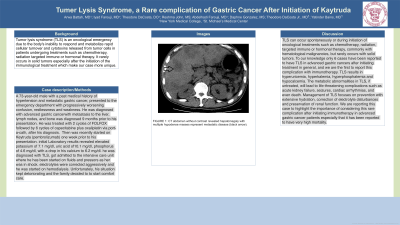Monday Poster Session
Category: Colon
P1719 - Tumer Lysis Syndrome - A Rare Complication of Gastric Cancer After Initiation of Keytruda
Monday, October 23, 2023
10:30 AM - 4:15 PM PT
Location: Exhibit Hall

Has Audio

Arwa Battah, MD
Saint Michael's Medical Center
Newark, NJ
Presenting Author(s)
Arwa Battah, MD1, Iyad Farouji, MD1, Theodore DaCosta, DO1, Reshma John, MS1, Abdelhadi Farouji, MD2, Daphne Gonzalez, MS2, Dema Shamoon, MD2, Yatinder Bains, MD3
1Saint Michael's Medical Center, Newark, NJ; 2Saint Michael's Medical Center, Newark, NJ; 3Saint Michael's Medical Center, New York Medical College, Newark, NJ
Introduction: Tumor lysis syndrome (TLS) is an oncological emergency due to the body's inability to respond and metabolize rapid cellular turnover and cytotoxins released from tumor cells in patients undergoing treatments such as chemotherapy, radiation targeted immune or hormonal therapy. It rarely occurs in solid tumors especially after the initiation of the immunological treatment which make our case more unique.
Case Description/Methods: A 73-year-old male with a past medical history of hypertension and metastatic gastric cancer, presented to the emergency department with progressively worsening confusion, restlessness and weakness. He was diagnosed with advanced gastric cancerwith metastasis to the liver, lymph nodes, and bone was diagnosed 9 months prior to his presentation. He was treated with 2 cycles of FOLFOX followed by 6 cycles of capecitabine plus oxaliplatin via port-a-cath, after his diagnosis. Then was recently started on Keytruda (pembrolizumab) one week prior to his presentation. initial Laboratory results revealed elevated potassium of 7.1 mg/dl, uric acid of 26 mg/dl, phosphorus of 4.6 mg/dl, with a drop in his calcium to 6.2 mg/dl. he was diagnosed with TLS, got admitted to the intensive care unit where he has been started on fluids and pressors as her was in shock. electrolytes were corrected aggressively and he was started on hemodialysis. Unfortunately, his situation kept detoriorating and the family decided to to start comfort care.
Discussion: TLS can occur spontaneously or during initiation of oncological treatments such as chemotherapy, radiation, targeted immune or hormonal therapy, commonly with hematological malignancies, but rarely occurs with solid tumors. To our knowledge only 6 cases have been reported to have TLS in advanced gastric cancers after initiating treatment in general, and we are the first to report this complication with immunotherapy. TLS results in hyperuricemia, hyperkalemia, hyperphosphatemia and hypocalcemia. The metabolic abnormalities in TLS, if untreated, will lead to life-threatening complications such as acute kidney failure, seizures, cardiac arrhythmias, and even death. Management of TLS focuses on prevention with extensive hydration, correction of electrolyte disturbances and preservation of renal function. We are reporting this case to highlight the importance of considering this rare complication after initiating immunotherapy in advanced gastric cancer patients especially that it has been reported to have very high mortality.
Disclosures:
Arwa Battah, MD1, Iyad Farouji, MD1, Theodore DaCosta, DO1, Reshma John, MS1, Abdelhadi Farouji, MD2, Daphne Gonzalez, MS2, Dema Shamoon, MD2, Yatinder Bains, MD3. P1719 - Tumer Lysis Syndrome - A Rare Complication of Gastric Cancer After Initiation of Keytruda, ACG 2023 Annual Scientific Meeting Abstracts. Vancouver, BC, Canada: American College of Gastroenterology.
1Saint Michael's Medical Center, Newark, NJ; 2Saint Michael's Medical Center, Newark, NJ; 3Saint Michael's Medical Center, New York Medical College, Newark, NJ
Introduction: Tumor lysis syndrome (TLS) is an oncological emergency due to the body's inability to respond and metabolize rapid cellular turnover and cytotoxins released from tumor cells in patients undergoing treatments such as chemotherapy, radiation targeted immune or hormonal therapy. It rarely occurs in solid tumors especially after the initiation of the immunological treatment which make our case more unique.
Case Description/Methods: A 73-year-old male with a past medical history of hypertension and metastatic gastric cancer, presented to the emergency department with progressively worsening confusion, restlessness and weakness. He was diagnosed with advanced gastric cancerwith metastasis to the liver, lymph nodes, and bone was diagnosed 9 months prior to his presentation. He was treated with 2 cycles of FOLFOX followed by 6 cycles of capecitabine plus oxaliplatin via port-a-cath, after his diagnosis. Then was recently started on Keytruda (pembrolizumab) one week prior to his presentation. initial Laboratory results revealed elevated potassium of 7.1 mg/dl, uric acid of 26 mg/dl, phosphorus of 4.6 mg/dl, with a drop in his calcium to 6.2 mg/dl. he was diagnosed with TLS, got admitted to the intensive care unit where he has been started on fluids and pressors as her was in shock. electrolytes were corrected aggressively and he was started on hemodialysis. Unfortunately, his situation kept detoriorating and the family decided to to start comfort care.
Discussion: TLS can occur spontaneously or during initiation of oncological treatments such as chemotherapy, radiation, targeted immune or hormonal therapy, commonly with hematological malignancies, but rarely occurs with solid tumors. To our knowledge only 6 cases have been reported to have TLS in advanced gastric cancers after initiating treatment in general, and we are the first to report this complication with immunotherapy. TLS results in hyperuricemia, hyperkalemia, hyperphosphatemia and hypocalcemia. The metabolic abnormalities in TLS, if untreated, will lead to life-threatening complications such as acute kidney failure, seizures, cardiac arrhythmias, and even death. Management of TLS focuses on prevention with extensive hydration, correction of electrolyte disturbances and preservation of renal function. We are reporting this case to highlight the importance of considering this rare complication after initiating immunotherapy in advanced gastric cancer patients especially that it has been reported to have very high mortality.
Disclosures:
Arwa Battah indicated no relevant financial relationships.
Iyad Farouji indicated no relevant financial relationships.
Theodore DaCosta indicated no relevant financial relationships.
Reshma John indicated no relevant financial relationships.
Abdelhadi Farouji indicated no relevant financial relationships.
Daphne Gonzalez indicated no relevant financial relationships.
Dema Shamoon indicated no relevant financial relationships.
Yatinder Bains indicated no relevant financial relationships.
Arwa Battah, MD1, Iyad Farouji, MD1, Theodore DaCosta, DO1, Reshma John, MS1, Abdelhadi Farouji, MD2, Daphne Gonzalez, MS2, Dema Shamoon, MD2, Yatinder Bains, MD3. P1719 - Tumer Lysis Syndrome - A Rare Complication of Gastric Cancer After Initiation of Keytruda, ACG 2023 Annual Scientific Meeting Abstracts. Vancouver, BC, Canada: American College of Gastroenterology.
